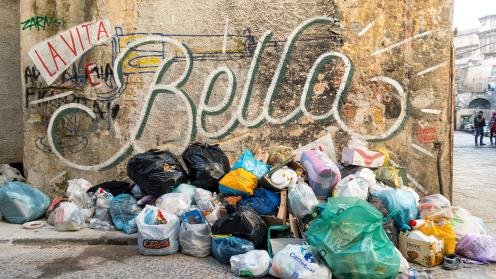Excitement pulsed through the venue as delegates gathered for the second session of the Intergovernmental Negotiating Committee (INC-2) to develop an international legally binding instrument on plastic pollution, including marine pollution, in Paris, France, on Monday, 29 May 2023.
Want to dig deeper? Read the full Earth Negotiations Bulletin daily report.
In opening statements, INC Chair Gustavo Meza-Cuadra, Peru, underscored the importance of collective action to address the whole lifecycle of plastic, which affects human health and the environment. Philippe Franc, Permanent Representative to the UN Educational, Scientific and Cultural Organization (UNESCO), France, expressed hope that INC-2 will be a decisive session in drafting the new treaty.
Describing plastic pollution as a “ticking time bomb,” President Emmanuel Macron, France, via video, called for greater innovation in creating new value chains for sorting, reusing, and recycling plastic, and urged incentivizing the private sector to move from linearity to circularity. He lamented the current practice of extracting fossil fuels for producing plastic, which is then discarded.
Inger Andersen, UN Under-Secretary-General and Executive Director, UN Environment Programme (UNEP), underscored that “we cannot recycle ourselves out of this mess,” calling on the private sector not to wait for a new treaty, but to take initiative on transforming production and manufacturing processes for eliminating unnecessary plastic.
Urging delegates to “make Paris count,” Jyoti Mathur-Filipp, Executive Secretary, INC Secretariat, expressed confidence that delegations will use INC-2 to narrow down the options and identify gaps, in order to leave Paris with the mandate for a zero draft. She committed to ensuring more effective participation at future meetings of the INC, lamenting the space constraints at the meeting venue.
The bulk of the morning session was reserved for the formal establishment of the INC bureau, a decision that had been postponed from INC-1. Bureau members from Africa, Asia-Pacific, Latin America and the Caribbean, and small island developing states (SIDS) were elected by acclamation.
In two secret ballots, UN Member States present at the session voted on the nominated bureau members from Eastern Europe, and the Western Europe and Others Group. In a heated debate before the vote, legal clarity was required, given the provisional nature of the INC’s rules of procedure, in particular on the participation of regional economic integration organizations. For this vote, individual UN Member States voted to elect Georgia, Estonia, Sweden and the US to the bureau.
In the latter part of the afternoon, the optimism of the morning waned as the INC embarked on a protracted discussion on the rules of procedure. Unable to agree on the way forward due to opposing views on which rules contain brackets, INC Chair Meza-Cuadra adjourned the session early to allow for consultations, noting that the issue would be reopened on Tuesday.
In the evening, delegations attended a reception hosted by the government of France.
To receive free coverage of global environmental events delivered to your inbox, subscribe to the ENB Update newsletter.
All ENB photos are free to use with attribution. For INC-2, please use: Photo by IISD/ENB | Kiara Worth.

















































